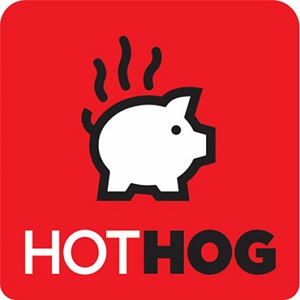Producers Can Now Go "Whole Hog" on New Heat Stress App for Pigs
Contact: Jan Suszkiw
Email: Jan.Suszkiw@usda.gov
June 15, 2023
HotHog, a new smartphone application ("app") that predicts heat stress in pigs, is now available for download and use, a team of Agricultural Research Service (ARS) and university scientists announced today.
Available in the Apple App Store and Google Play Store, HotHog taps into local weather data to predict the relative comfort or heat stress levels of pigs on an hourly, daily or weekly basis. Swine producers can then use this information to take pre-emptive measures, like ensuring plenty of drinking water, cooling the pigs with fans or mists, and limiting transport to early morning hours.
Annually, heat stress in pigs costs the U.S. swine industry an estimated $481 million in revenue losses. Ensuring the positive welfare and productivity of pigs (a top source of animal protein worldwide) will be even more critical in the face of global climate change—particularly during the summer months and in tropical regions, noted Jay S. Johnson, an animal scientist who leads the ARS's Livestock Behavior Research Unit in West Lafayette, Indiana.
Pigs are especially vulnerable to heat stress because they cannot sweat. In modern production settings, pigs cope with heat through panting, while the caregivers adjust ventilation rates, utilize sprinklers, and ensure free access to abundant, cool water for the animals to drink. Without such measures, pigs may start to eat less, grow slower, produce less lean muscle, produce less milk and experience other health, productivity or fertility problems.
Gestating sows are among a swine herd's most vulnerable members, and when heat-stressed, they may give birth to fewer and smaller piglets. Heat-stressed gestating sows may also give birth to in utero heat-stressed piglets that have a greater risk of health and other complications in their postnatal life.
According to its developers, HotHog is the first decision-support tool of its kind to predict thermal stress based on behavioral and physiological data collected from heat-load studies of swine—and more precisely, from non-pregnant breeding females and mid- and late-gestation sows. This is what differentiates the app from other decision-support tools that are now available to swine producers.
 HotHog is a new smartphone app that producers can now use to predict heat stress in swine. (Image courtesy of Jay Johnson)
HotHog is a new smartphone app that producers can now use to predict heat stress in swine. (Image courtesy of Jay Johnson)
"Additionally, many thermal indices currently in use were originally developed for use in non-swine species and may not accurately predict thermal comfort and stress in pigs," added Johnson. The HotHog app was developed, tested and released with collaborators from the University of Illinois at Urbana-Champaign (UIUC); Purdue University (Purdue) in West Lafayette, Indiana; and the Oak Ridge Institute for Science and Education (ORISE) in Oak Ridge, Tennessee.
Compatible with iPhone and Android smartphones, the app offers several features, including:
- Settings for geographic user locations—from Shiloh, Illinois, to Brisbane, Australia, for example
- Current local time and weather, including temperature forecasts color-coded to one of six thermal states (or categories) in swine—namely, cool, comfortable, warm, mild heat stress, moderate heat stress and severe heat stress
- Four graphic icons for additional user options located at the bottom of the app's display screen.
Clicking on the pig icon, for example, describes physiological and behavioral signs associated with the thermal state predicted to affect the herd's sows. Clicking on a fan icon displays a page titled "Management Observations and Mitigation Options," which provides recommendations for ensuring the sows' comfort based on the thermal state that the app has predicted.
Another icon resembles a gear. "It takes the user to a settings page where they can edit their individual profile and set specific preferences, such as switching between dark and light mode or specifying whether temperatures are presented in Fahrenheit or Celsius," Johnson explained. "Users can also find information there on how the app was developed, considerations for use of HotHog, and options to report problems with HotHog or ask specific questions."
Johnson's HotHog collaborators are Betty McConn (ORISE), Allan Schinckel, Lindsey Robbins and Brianna N. Gaskill—all of Purdue University, Angela Green‑Miller (UIUC) and Donald Lay Jr. (ARS). They began work on the project in 2018 under a grant from USDA's National Institute for Food and Agriculture and have published several papers reporting their findings, including the December 2022 online issue of the Journal of Animal Science and Biotechnology.
Future updates to HotHog will include Spanish translation, push notifications and thermal predictions for boars, nursery pigs and growing-finishing pigs, among other groups. The app will apply these updates through the Apple App Store and Google Play Store updates, Johnson said.
The Agricultural Research Service is the U.S. Department of Agriculture's chief scientific in-house research agency. Daily, ARS focuses on solutions to agricultural problems affecting America. Each dollar invested in U.S. agricultural research results in $20 of economic impact.
